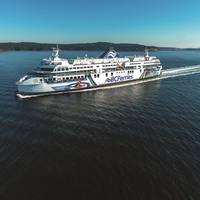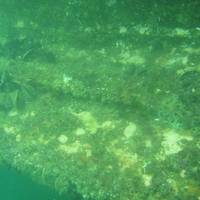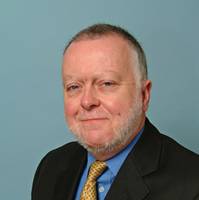USCG Approves ABS Wavesight eLogs for US-flagged Vessels

ABS Wavesight on Thursday announced its eLogs software has received formal approval from the U.S. Coast Guard (USCG) for use by U.S.-flagged ships. The ABS-affiliated software-as-a-service company is now one of three maritime software providers to receive such approval on the basis of the USCG’s guidance under USCG NVIC 01-23."The maritime industry is entering an era of rapid digitalization,” said Gurinder Singh, Director of Solutions Engineering at ABS Wavesight. “We are proud to be at the forefront of that transformation, and the fact that our eLogs software meets all of the U.S.
Ferry Industry Sets Pace on Critical Solutions

Interferry CEO Mike Corrigan describes a distinctly upbeat period in the worldwide ferry community – and explains how the global trade association plans to take its support to far-reaching new levels.There are times when the phrase “there are three kinds of lies: lies, damned lies and statistics” seems all too true, but here’s an honest number for you – ferries carry a global total of more than 2 billion passengers a year, which is almost on a par with airlines.Hard to believe? Not for those of us in the industry, but almost certainly for many citizens and politicians.
Kyriacou to Lead De Nora's BWMS Unit

Electrochlorination equipment supplier De Nora announced that Dr. Stelios Kyriacou has been appointed as General Manager of its BALPURE Ballast Water Management System (BWMS) business unit. Dr. Kyriacou joins De Nora Water Technologies from Wärtsilä, where he managed the research, development, design and certification of the full Wärtsilä BWMS range. He previously undertook the same role at Hamworthy from 2009 until its acquisition by Wärtsilä and held roles at Hatlapa Marine Equipment. Dr.
Is Tin Returning in Silicone Hull Coatings?

The reemergence of organotin in marine hull coatings is of increasing concern, with academics and environmentalists calling on International Maritime Organization (IMO) to investigate the use of tin in silicone-based foul release systems and other ships hull coatings. While use of the organotin tributyltin (TBT) was outlawed as an active biocide almost 10 years ago, the IMO is claimed to “have left the door open” for tin as a catalyst, but according to some academics the amount of organotin used suggests it could be acting as the active agent. Dr.
Scrubbers Set to Help Shippers Meet the New Sulfur Cap
The 0.5 percent global sulfur cap by 2020 requires marine industry action. “By 2025, up to 20 percent of the global fleet could have [scrubber] technology installed,” estimates DuPont Clean Technologies Marine Business Development Manager, Europe, Marco Dierico. “Ship owners and operators that want to minimize costly changes and continue to burn heavy fuel oil (HFO) will require a scrubber to clean the fuel. The October 27 decision from the International Maritime Organization’s (IMO) Marine Environmental Protection Committee (MEPC) to enforce a global 0.5 percent cap on sulfur emissions from fuels by 2020 will necessitate ship owners and operators to select an emissions abatement solution in order to meet the new requirements.
Liberia provides lead with BWMS proposal to IMO
The Liberian Maritime Administration is to introduce a proposal to the meeting of the IMO Marine Environmental Protection Committee (MEPC70) in London on 24 October to allow certain ships additional time beyond 2020 to install adequate ballast water management systems as required under the Ballast Water Management Convention, which comes into force in September 2017. The proposal, says Liberia, would ensure that enough adequate systems and sufficient dockyard space are available. With effect from 8 September, 2017, most oceangoing ships engaged in worldwide operations will be required to install a ballast water management (BWM) system approved in accordance with IMO guidelines.
ICS Welcomes IMO Progress on Issues

The International Chamber of Shipping (ICS), which represents over 80% of the world merchant fleet, has welcomed the acknowledgment by governments at the International Maritime Organization (IMO) that there will be significant problems with the implementation of the Ballast Water Management (BWM) Convention. However, ICS feels that the type-approval process for expensive new treatment equipment is seriously flawed and that much more work still needs to be done by governments to rectify the current situation.
Dubai Maritime City Authority Supports Environmental Efforts
The United Arabs Emirates Shipping Association, a representative body for UAE-based commercial shipping, is supporting the efforts of the UN, IMO, and UAE Ministry of Environment and Water and DMCA in advocating for a global and open verifiable emissions trading program. One of the challenges that face the marine industry is reconciling their global reach with local expectations. As of the last IMO Marine Environmental Protection Committee (MEPC) meeting there is no globally accepted or approved method or protocol to assign and include shipping in national or transnational carbon emissions reduction process. Al Ghurair added: “The carbon cost of carrying a ton of freight by ship is 10 times less than by road – and 100 times less than by air.
INTERTANKO Welcomes IMO’s Revisions to MARPOL Annex VI
An historic agreement was struck last week when the International Maritime Organization’s (IMO) Marine Environmental Protection Committee (MEPC 57) reached agreement on a package of amendments and revisions to MARPOL(*) Annex VI (Prevention of Air Pollution from Ships) which, subject to formal adoption at MEPC 58 in October 2008, will enter into force through the tacit amendment procedure in February 2010. These measures provide for the wellbeing of our environment, and of those who live and work on ships or near ports. They address regional and global concerns on sulphur oxide (SOx), nitrogen oxide (NOx) and Particulate Matter (PM) emissions from both new and existing ships in an integrated manner…
The New IMO Treaty to Ban TBT
The Diplomatic Conference held (October 1-5, 2001) by the International Maritime Organization (IMO) in London adopted the Draft Convention prepared by The Marine Environmental Protection Committee (MEPC) of IMO for the "Control of Harmful Anti-fouling Systems for Ships." The Convention has been developed to immediately ban the use of Tributyltin (TBT) globally in antifouling paints to "protect the marine environment". The ban on TBT has come about because TBT has detrimental effects on non-target marine organisms. In November 1999, IMO agreed that a Treaty be developed by the MEPC to ensure a ban on the application of TBT based antifouling paints by January 1, 2003, and a total ban on the use of TBT by January 1, 2008.







